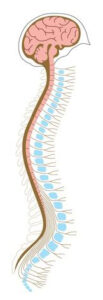Pain serves an important function in our lives. When you suffer an acute injury, pain warns you to stop the activity that is causing the injury and tells you to take care of the affected body part.
Chronic pain, on the other hand, persists for weeks, months, or even years. Some people, often older adults, suffer from chronic pain without any definable past injury or signs of body damage. Common chronic pain can include headaches, low back pain and arthritis. Unfortunately, there is scant objective evidence or physical findings to explain such pain.
 Until recently, some doctors who could not find a physical cause for a person’s pain simply suggested that it was imaginary — “all in your head.” This is unfortunate, because we know that all pain is real and not imagined, except in the most extreme cases of psychosis. Emerging scientific evidence is demonstrating that the nerves in the spinal cords of patients with chronic pain undergo structural changes.
Until recently, some doctors who could not find a physical cause for a person’s pain simply suggested that it was imaginary — “all in your head.” This is unfortunate, because we know that all pain is real and not imagined, except in the most extreme cases of psychosis. Emerging scientific evidence is demonstrating that the nerves in the spinal cords of patients with chronic pain undergo structural changes.
Psychological and social issues often amplify the effects of chronic pain. For example, people with chronic pain frequently report a wide range of limitations in family and social roles, such as the inability to perform household or workplace chores, take care of children, or engage in leisure activities. In turn, spouses, children and co-workers often have to take over these responsibilities. Such changes often lead to depression, agitation, resentment and anger for the pain patient and to stress and strain in family and other social relationships.
How is depression involved with chronic pain? Depression is the most common emotion associated with chronic pain. It is thought to be three to four times more common in people with chronic pain than in the general population. In addition, 30 to 80 percent of people with chronic pain will experience some type of depression. The combination of chronic pain and depression is often associated with greater disability than either depression or chronic pain alone.
People with chronic pain and depression suffer dramatic changes in their physical, mental and social well-being—and in their quality of life. Such people often find it difficult to sleep, are easily agitated, cannot perform their normal activities of daily living, cannot concentrate, and are often unable to perform their duties at work. This constellation of disabilities starts a vicious cycle—pain leads to more depression, which leads to more chronic pain. In some cases, the depression occurs before the pain.
Until recently, we believed that bed rest after an injury was important for recovery. This has likely resulted in many chronic pain syndromes. Avoiding performing activities that a person believes will cause pain only makes his or her condition worse in many cases.
Depression associated with pain is powerful enough to have a substantial negative impact on the outcome of treatment, including surgery. It is important for your doctor to take into consideration not only biological, but also psychological and social issues that pain brings.
What is the treatment for chronic pain and depression?
The first step in coping with chronic pain is to determine its cause, if possible. Addressing the problem will help the pain subside. In other cases, especially when the pain is chronic, you should try to keep the chronic pain from being the entire focus of your life.
Stay active and do not avoid activities that cause pain simply because they cause pain. The amount and type of activity should be directed by your doctor, so that activities that might actually cause more harm are avoided.
- Relaxation training, hypnosis, biofeedback, and guided imagery can help you cope with chronic pain. Cognitive therapy can also help patients recognize destructive patterns of emotion and behavior and help them modify or replace such behaviors and thoughts with more reasonable or supportive ones.
- Distraction (redirecting your attention away from chronic pain), imagery (going to your “happy place”), and dissociation (detaching yourself from the chronic pain) can be useful.
- Involving your family with your recovery may be quite helpful, according to recent scientific evidence.
Feel free to discuss these or other techniques with your doctor of chiropractic. He or she may suggest some simple techniques that may work for you or may refer you to another healthcare provider for more in-depth training in these techniques.
Signs and Symptoms
Some of the common signs and symptoms of chronic pain include:
- Pain beyond six months after an injury.
- Allodynia—pain from stimuli which are not normally painful and/or pain that occurs other than in the stimulated area.
- Hyperpathia—increased pain from stimuli that are normally painful.
- Hypersensation—being overly sensitive to pain.
Signs of major clinical depression will occur daily for two weeks or more, and often include many of the following:
- A predominant feeling of sadness; feeling blue, hopeless or irritable, often with crying spells.
- Changes in appetite or weight (loss or gain) and/or sleep (too much or too little).
- Poor concentration or memory.
- Feeling restless or fatigued.
- Loss of interest or pleasure in usual activities, including sex.
- Feeling of worthlessness and/or guilt.
Schedule an Appointment - We are here to help you!
Overland Park, KS Clinic
6701 W. 121st Street | Suite 200
Overland Park, KS 66209
913-643-1771
913-643-1775
Olathe, KS Clinic
10454 S. Ridgeview Rd.
Olathe, KS 66061
913-689-2333
913-689-2334
Prairie Village, KS Clinic
4121 W. 83rd St. | Suite 147
Prairie Village, KS 66208
913-490-4444
913-490-4445
Raytown, MO Clinic
10803 E State Rte 350 | Suite B
Raytown MO 64138
816-356-9313
816-425-2117
Lee's Summit, MO Clinic
338 Southwest Main St.
Lee's Summit, MO 64063
816-600-5483
816-524-5328
Belton/Raymore, MO Clinic
17027 Bel-Ray Blvd.
Belton, MO 64012
816-425-7015
816-425-2117
Blue Springs, MO Clinic
622 SW US 40 Hwy
Blue Springs, MO 64014
816-815-7007
816-815-7008
Liberty, MO Clinic
1520 N. Church Rd | Suite C
Liberty, MO 64068
816-831-3600
816-831-3601






